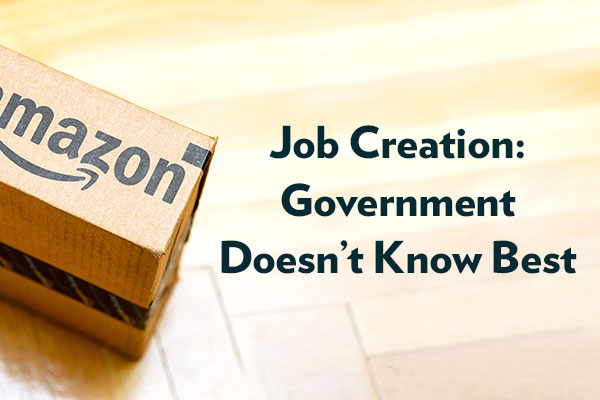Media

Government Job Creation is a Myth
Can government create jobs? If you ask Gov. Tom Wolf, you won’t get a straight answer.
On the one hand, Wolf promised Amazon millions—likely billions—in taxpayer subsidies to build a second headquarters in the commonwealth and create jobs. On the other, Wolf recently took to Twitter to complain of corporations getting “massive tax breaks” that haven’t helped workers.
Which is it? Is bribing one of the world’s largest corporations with public money good for workers or not?
Let’s settle this question for good: Government does not know best when it comes to creating jobs and driving income growth. From so-called “economic development” spending to minimum wage mandates, well-intentioned but counterproductive public policy permeates both sides of the political aisle.
True, Amazon’s promise of 50,000 new jobs is substantial. But you may be shocked to learn Pennsylvania employers already hire 92,000 workers per month. The state’s one-million-plus small businesses do the bulk of this hiring—without government “help.”
Politicians typically ignore this free-market phenomenon, instead claiming tax credits and subsidies are necessary for job growth. After all, these targeted perks mean opportunities for elected officials to send self-congratulatory press releases and attend ribbon cuttings ceremonies.
But press releases don’t create jobs.
Despite leading the nation in government handouts to corporations, at more than $6 billion since 2007, Pennsylvania lags the nation in job growth. What’s worse, incentives for a few select businesses mask a poor tax climate that harms all businesses.
For example, Pennsylvania’s corporate income tax is the second-highest top rate among the 50 states. No wonder WalletHub recently ranked Pennsylvania 46th among the “best states for jobs.”
To attract business investment, lawmakers should stop trying to bribe politically-connected businesses like Amazon and lower taxes on all businesses.
We should be striving for an equal—and enticing—playing field for all job creators.
Job growth isn’t the only area where politicians get it wrong. Too many also embrace the false belief that hiking the minimum wage is the only way Pennsylvanians will get a raise.
Yet data collected by the Wolf administration refutes this. Fewer than 2 percent of Pennsylvania workers earn the minimum wage. And, since 2010, the number of minimum wage workers fell by 50 percent (from 206,000 to 106,000) while the total number of employed Pennsylvanians grew.
Businesses are hiring workers at higher wages, then giving them raises as they stay on the job. This is not a government mandate; it’s what businesses do when left alone. But politicians can’t take credit for it. Perhaps that’s why they don’t talk about it.
Instead, they demand a minimum wage hike, knowing it would kill 33,000 jobs, according to an Independent Fiscal Office analysis. The first to get pink slips would be younger and low-skilled workers.
Thankfully, there’s a better way.
The recent federal tax reform inspired dozens of Pennsylvania employers to announce bonuses, new investments, and, yes, wage increases. PNC Bank in Pittsburgh announced massive new investments while raising its starting wage to $15 an hour. Companies fromComcast to Kraft Heinz, Wells Fargo to FNB Corporation followed suit with similar good news for workers.
The principle is simple: When businesses keep more of their money, they invest more—leading to higher wages and job creation.
Instead of mandating higher wages, Wolf and lawmakers should empower Pennsylvanians to spur economic growth by reforming our tax code and reducing the tax burden on working families.
To do this, they must first control spending. A good first step is passing the Taxpayer Protection Act, which puts government on a sustainable growth path by limiting spending increases to inflation and population growth.
This commonsense reform would help ensure government doesn’t grow faster than taxpayers’ ability to pay and allow families and job creators to keep—and invest—more of what they earn. The state House has already passed the Taxpayer Protection Act has—it’s time for the Senate to do the same.
We shouldn’t have to bribe job creators to choose Pennsylvania. Government leaders must recognize that only by freeing the private sector can we create opportunity. As the axiom goes: You can grow the government, or you can grow the economy, but you can’t grow both.